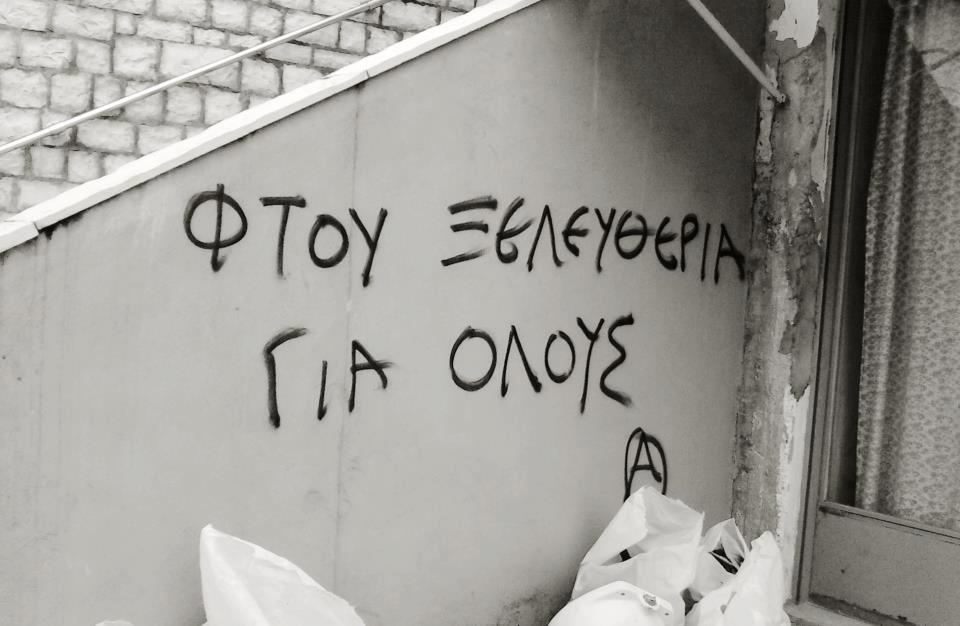‘For sure, contradiction holds lead in our detractors’ criticism. Thus, the alleged “defeat” of claiming responsibility is used at the same time by innocent imprisoned anarchists, and solidarians of theirs, as main alibi for proving that they are not associated with what cops accuse them of (take the trial for the 250 attacks of the Conspiracy of Cells of Fire for example, in which other, unrelated individuals are accused along with us). So, if it weren’t for the “defeat” of our choice to claim responsibility, and we had had recourse to vague silence—since there is legally no evidence against us (fingerprints, DNA samples, or recognition by eyewitnesses)—some would probably raise “complaints”…’
The specific excerpt is part of a text of the CCF published on October 15th, 2013. From our side, we would like to clarify any issues raised in this paragraph, in their attempt to create a false impression through fuzzy expressions that exacerbate confusion. First off, it is highly problematic to use the term “solidarians of theirs,” as it is offensive to any comrade who has participated in gestures and initiatives of solidarity with us to be cited as a person in solidarity “belonging to us.” The use of the possessive pronoun is incorrect because it conveys a sense that every prisoner has solidarians exclusively of their own.
Just to be clear, we do not have solidarians “of our own” because we do not think in those terms. Additionally, on no occasion have we ever referred to the prosecutions we face using the legal polarity of innocent and guilty, because it’s a derivative of bourgeois legality, so under no circumstance do we invoke our innocence in a general and vague way for the sole purpose of obtaining more favorable sentences. Courts may convict us, but they cannot judge us; courts may acquit us, but they cannot vindicate us. We have accepted our share of deeds, and we have declared that the weapons found in our possession are not associated with the organization’s activity. For us, our presence in court serves the purpose of exposing the tactics and manipulations by the police and the judges that have resulted in our indictment on the heaviest possible charges, with four different accusatory instruments filed against us so far, with perhaps another forthcoming from the Italian State.
Nevertheless, the CCF insist—either in the courtroom or in writing—to demean us, as well as others, by referring to us as “innocent defendants.” Only concerned can one be about the fact that the polarity of innocence and guilt is embodied in the discourse of a revolutionary organization, a hostile polarity introduced by the state power on which numerous brochures and texts have been written.
In our opinion, the act of claiming responsibility for participation in an organization is not a defeat, nor do we share such a mindset. Either way, no one claims that they are innocent because other anarchists have claimed responsibility for their participation in an organization. It is really an insubstantial position to allege that the responsibility claim of the CCF members is presented as—main, they say!—alibi by those who are accused along with them. Do they allege that, instead of invoking the lack of evidence on the part of the police, we claim that some others are members in order to confront every indictment? This has never happened.
We have remained in prison for almost three years, facing lengthy prison terms and allegations on which we haven’t even been tried in the first instance. Whenever we want to make a public intervention using indymedia, we do not aim to take part in a public arena, but in the context of counter-information. We realize that this particular intervention does not offer anything per se; however, to let an imaginary fact be rendered as true, recounted in a deliberately abstract manner, would only create confusion and allow for insinuations.
Alexandros Mitroussias, Giorgos Karagiannidis
Koridallos prisons, October 22nd, 2013

